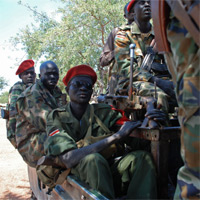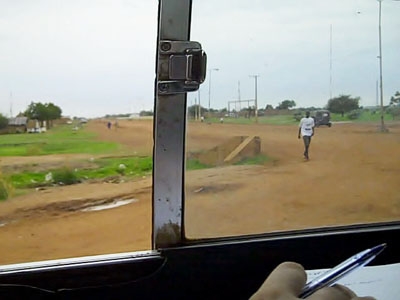
BENTIU, Unity State, Southern Sudan – “We need the referendum to get freedom,” declared a headmistress in a classroom in Unity state, expressing a view that is widely shared among many in South Sudan, and one that has defined the population’s expectations of what the vote will bring.
“This referendum will bring us stability,” said an educator also from the state.
Another added, “The referendum will bring lasting peace to Sudan as a whole.”
These educators had come from all over Unity state for a training workshop in the state capital of Bentiu where Enough’s former field researcher Maggie Fick and I recently traveled. While there, we gleaned a sense of the expectations surrounding the January 2011 secession vote for South Sudan. Bentiu is the seat of a state government that, despite its failures, appears to have the population’s loyalty because the referendum demands it.
The thinking of the southerners is that if they rise up against the government before the referendum, a national NGO worker said, “the jallaba,” using a historic term for opportunistic northern slave traders and businessmen, “will exploit the situation.” He continued, “Let us hide our colors now.”
The population of Bentiu, in particular, has plenty of reason to be agitated. Unity state is home to the majority of the South’s oil-producing blocks and shares a porous border with North Sudan. Its strategic importance and relative wealth has made the state both a coveted commodity among powerful actors in the South’s ruling party, the SPLM, and its military arm the SPLA, and the scene of confrontation between North and South. As a result, Unity state is heavily militarized, occupied by forces loyal to a handful of different powerful players—a recipe for recurring insecurity.
For the local population, elite wrangling over control of Unity has not translated into a particularly accountable or democratic state government, but has made those in power eager to shut down any sign of political dissent. Throughout the elections and especially after, the state’s security apparatus effectively shut down opposition by harassing and arresting independent candidates, their party agents, and supporters. Officially, incumbent governor Taban Deng Gai won the election, but the result was contentious, leaving many people dissatisfied and convinced that the polls was a stolen opportunity for change.
One militia led by Galwak Gai, reportedly a supporter of an independent candidate who ran against Deng, has already risen up in Unity—demonstrating the ease with which grassroots violence can take place. His forces clashed with the SPLA several times from late May until mid-June when, according to the army, he was driven out of the state. The state’s response has been severe; some NGO workers have been arbitrarily detained on suspicion of cooperating with the militia, and the governor recently decided to freeze the assets of all independent candidates for similar reasons. The SPLM/A see demonstrations of political opposition as a “crime,” and its response has been in line with this attitude, leaving many bitter and resentful. “The youth will rise up after the referendum,” warned an active opposition supporter.
Many Unity voters wanted to unseat Governor Deng because they are convinced that there is gross corruption and financial mismanagement at the state level. As one of two southern states that produce oil, Unity is entitled under the Comprehensive Peace Agreement to two percent of total oil revenues. According to the Ministry of Finance and National Economy, the national government transferred $12.6 million in the first quarter of 2010 to Unity state.[1] But while this relative wealth has translated into an abundance of oil infrastructure—the capital and its surrounding areas are marked by paved roads, bridges, electricity towers, and airfields—little seems to have benefited the population. Unity ranks as the second lowest state in terms of poverty incidence in the South.[2] One national NGO worker claimed that over half of Unity’s population still drinks unclean river water.
Government employees frequently suffer from salary delays, ranging in length from five months to a year. Some observers believe that the governor uses state revenues to maintain political alliances with SPLM elite in Juba. “I don’t know what their priorities are. Sometimes you even see traditional chiefs with cars and there are no salaries,” said the NGO worker. “There is corruption, it is well-known there is.”
But in the classroom where the teacher training was taking place and along the streets of Bentiu, the prevailing sentiment is not anger or resentment toward the state government; it is joy and anticipation for the referendum. Among many South Sudanese, expectations for what secession will bring tomorrow override the SPLM’s failings today. Said one of the educators: “We hope we are going to succeed.”
Part of the reason for this faith is that many South Sudanese believe the Khartoum government remains at fault for much of the population’s woes, and only separation can enable southerners to fully address their own needs. In Bentiu, it is conventional wisdom that the ruling National Congress Party is cheating the state and the South out of its oil money. “The resources are in the hands of the NCP,” explained a recently elected member of Unity’s state parliament. “Because we are not getting 50 percent of the oil, it is hampering the implementation of all the policies. After the referendum, if the South becomes independent, there will be an independent budget whose money will not come from the NCP.”
The SPLM also holds the population’s trust because they are seen as the “Liberators.” The party fought for and brought the region out of civil war, and is seen as the only institution capable of bringing the South its legal independence. Even the more cynical, those who acknowledge that many of the issues facing the South originate from the SPLM and not just the North, believe that now is not the time to air those grievances.
“There will be reconciliation after the referendum. These are internal differences,” a national UNMIS official emphasized, implying that the more pressing issue is for South Sudan to resolve its bigger and long-standing issues with Khartoum. But, as another UNMIS official observed, “the people are keeping count.”
If South Sudan becomes a new state, the SPLM will have to face these internal issues, part of which has become the expectation that secession will bring dramatic change. Many Bentiu residents expressed the belief that after secession, the South will see significant increases in oil revenues that will bring development and improvements in basic services. “A lot of people expect an economic boom after a new-born, independent South Sudan,” the opposition supporter said. But these expectations often overlook the fact that a yet-to-be negotiated portion of the oil revenue will likely still go to the North and that for revenue to become infrastructure, services, and goods requires, among other things, capacity, transparency, and political will—all of which will be slow to come.
Some South Sudanese also expect the SPLM to usher in political transformation, despite the heavy-handed approach that the party and its security forces have adopted in managing political dissent. Many in Bentiu spoke enthusiastically of a new constitution and new elections soon after separation—elections that they believe will usher in political pluralism and reflect the will of the people.

View from the bus on the road from Bentiu to Tharjath in Unity state, South Sudan. (Enough-Amanda Hsiao)
If the SPLM do not meet these expectations for responsible governance, popular anticipation will quickly be replaced by deep-seated grievances and disappointment. As seen in the elections aftermath, South Sudan remains a region susceptible to local uprisings and spontaneous violence. And though southerners and the South’s ruling elite alike have temporarily dismissed the urgency of internal challenges, the potential for those issues to turn into violence after secession is very real. As Governor Taban Deng said in his own words to Enough, “The expectation of the population itself is a threat. The expectation of the population is in the sky.”
[1] United Nations Security Council. “Report of the Secretary-General on the Sudan.” 19 July 2010. http://www.un.org/Docs/sc/sgrep10.htm Last accessed on August 4, 2010.
[2] Southern Sudan Centre for Census Statistics and Evaluation. “Poverty in Southern Sudan.” March 2010.

